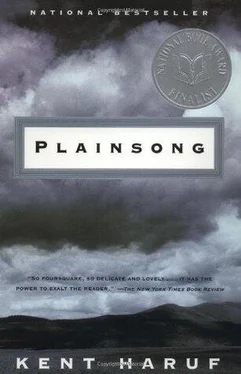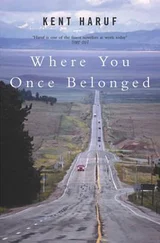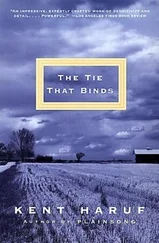I expect you’d like to have a idea where your bedroom’s at, Harold said. He motioned toward the small room off the dining room. They entered it. It was almost completely filled by an old soft double bed covered by an ancient quilt, and standing against the inside wall was a heavy mahogany chest of drawers. The girl walked around the foot of the bed and opened the closet door. Inside were dusty cardboard boxes and the dark clothes of a man and woman hanging from a silver rod, the clothes so old that they were no longer black but almost purple.
All this here was theirs, Harold said. They used to sleep in here in this room.
Your mother and father? Maggie said.
After they was gone, he said, I expect we got use to thinking of it as storage space. He glanced at the girl. Course, you move things around however you want.
Thank you, the girl said.
Because we don’t come in here, Raymond said. This’ll be just yours alone. Our bedrooms is upstairs.
Oh, she said.
Yes, he said.
Well, Harold said. And out here’s where you step out.
The girl turned toward him, questioning.
Right next door to you. Convenient.
The girl looked puzzled yet. She turned to Maggie Jones.
Don’t look at me, Maggie said. I don’t know what he’s talking about.
What? Harold said. Why hell. You know. The commode. The indoor outhouse. Well, what do you call it?
That’ll do fine, Maggie said.
Our mother always called it where you step out.
Did she?
That’s what she always called it, he said. He scratched his head. Well, damn it, Maggie, I’m just trying to be proper. I’m just trying to get us started off on the right chalk. I don’t want to scare her off already.
Maggie patted his smooth-shaven cheek. You’re doing just fine, she said. Keep going.
They went out of the bedroom. And while the others waited in the dining room the girl stepped into the bathroom. Another small room, it had a sink and toilet and a freestanding enameled tub with a red hose and showerhead coiled under the faucet at one end. On the shelves above the sink were various half-used jars of liniment and salve and Cornhuskers handbalm, and tubes of back-rub and sore-muscle ointment, and there was also tooth powder and denture adhesive and shaving equipment, and hanging over one of the drying rods next to the bathtub, together with two old towels, was a single fresh new pink towel that still had the store tag stapled to it. The girl came back out of the room. Should I get my suitcase now? she said.
I think that would be a good idea, Maggie Jones said.
You need any assistance? said Raymond.
No thank you. I think I can do it, the girl said, then went out through the kitchen to the car.
When she had gone Harold said, She ain’t very big, is she. Why, she’s just a little thing. She don’t even show the baby any that I can see.
Not much yet, Maggie said. Some of her clothes are beginning to get tight. You’ll notice it more when she takes her coat off.
Is she scared of us? Raymond said. She don’t say much.
What do you think? Maggie Jones said.
Raymond looked out the window toward the car where the girl stood at the trunk gathering her belongings. She don’t have to be, he said. We wouldn’t hurt her. We wouldn’t do her a harm for anything in this world.
I know that, Maggie said. But she doesn’t know it yet. You’ll have to give her time.
The girl returned to the house carrying a single cardboard suitcase and dragging a plastic trash bag. These she took into the bedroom. They could hear her in the room, moving about on the wood floor, temporarily arranging things, then she came back out.
I’m afraid this is a hard trial for you, Raymond said to the girl. He was not looking at her, but peering past her into some distance of his own. But we want to hope. . What I want to say is, Harold and me, we want to think that you might come to feel a little at home out here. In time, I mean. Not right away, I don’t guess.
She looked at him, then at his brother. Thank you, she said. Thank you for letting me stay here with you.
Well, you’re welcome, Raymond said. You sure are.
They stood awkwardly inspecting the floor.
Very well then, Maggie said. I believe I’ve done my part. So I think I’ll just go home and let you three souls get acquainted.
The girl looked startled. On the McPheron brothers’ faces there was the look of panic. Do you have to leave already? the girl said.
I think so, Maggie said. I think I better. It’s time.
We thought you might stay to supper, Harold said. Wouldn’t you care to do that?
Another time, she said. I’ll be back.
She went outside and the McPheron brothers and the girl followed her out and stood on the little screened porch in the wind, watching until she had driven away in the car. Then they turned and came back inside and stood looking at one another from across the bare wooden table in the kitchen.
Well, Harold said. I reckon—
The house was quiet. From outside came the faint sound of birdsong, coming up from the red cedar trees next to the garage, and there was the rising and falling noise of the wind.
— I reckon Raymond and me better go out and feed before it gets full dark, he said. Then we’ll come back in. We’ll have to see about getting some supper.
The girl looked at him.
It won’t take us long, he said.
What is it you’re feeding?
Cattle.
Oh.
Mother cows and heifers, Raymond said.
Oh.
The McPheron brothers and the girl stood looking at one another.
I guess I can get unpacked, the girl said.
When supper was finished they sat on in the dining room in the quiet. The table had been cleared already and the dishes washed and rinsed and left to dry. Raymond sat at one end of the table bent over the Holt Mercury newspaper spread out before him, reading, licking his finger when he turned the pages, his wire glasses low down on his nose. While he read he rolled a flat toothpick back and forth in his mouth without once touching it. Harold sat at the other end of the table. He was turned out from it, his knees spread open, and he was rubbing Black Bear Mountain mink oil into the thick leather of a work boot. Beside his chair the other boot was flopped over empty on the patterned and cracked linoleum.
Outside the house the wind had risen higher than it had been in the afternoon. They could hear it crying around the house corners, heaving and whining in the bare trees. The dry snow was lifted by the wind and blown past the windows and it carried in sudden gusts across the frozen yard under the farmlight that hung from a telephone pole out back. The snow swirled and sped in the bluish light. In the house it was quiet.
Across the room the door was closed. She had gone into her bedroom after supper and they had not heard anything from her since. They didn’t know what to think of this. They wondered privately if all seventeen-year-old girls disappeared after eating supper.
When he had both boots oiled to his requirements Harold stood up and set them out in the kitchen where they gleamed mutely against the wall. Then he came back and crossed to her door and stood listening with his head canted and his eyes staring. He knocked on the door.
Victoria? he said.
Yes.
Everything all right in there?
You can come in, she said.
So he entered her room. It was hers already. She had made it so. It was female now, cleaner and tidier, with little things set out in place. For the first time in half a century someone had taken an interest in the room. The old cardboard boxes were pushed under the bed and the clothes in the closet had been shoved back farther into the dark. Against the wall the old mahogany chest of drawers, its oval mirror darkened and finely cracked at the edges, had been dusted and polished, and her belongings were now arranged on it, hair ribbons and comb and brush, lipstick and liner, hair clasps, a little cedar box of jewelry whose lid was closed by a tiny brass lock.
Читать дальше







